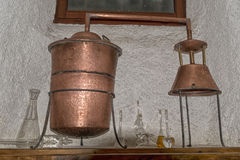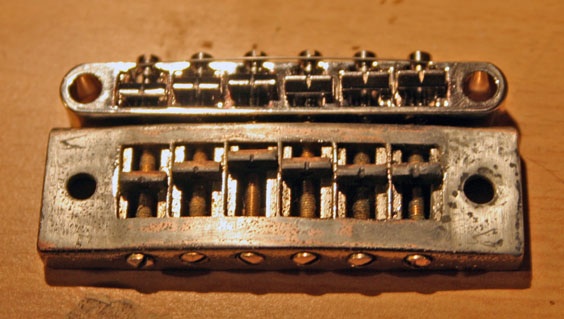I'm adding this after writing the swill below, because I want to be sure that you know I'm not being negative about this in any way, okay?
I've been fixing guitars and attempting to play them for for four and a half decades, and I find that I've *gotten better at both. One of the great joys of my life is that I won't be confronted with some of the hack-jobs I did along the way, especially in those crucial 15-to-21 ages when you make some of the worst decisions of your life and when anybody asks why, you just shrug and do something dumber.
Okay, so with that out of the way, the rest of this tirade is about how I view instrument care as a geezer myself. At one point I could see taking a belt sander to my Rolex, but at this point my rule with guitar repair is: if you can't tell what I did, then I did it right.
So that's the spirit of my rant. Most of what I know is stuff I learned from others.
----------------------------------------------------
I would never use abrasives on an Alembic, simply because you don't need to.
I'm not sure what kind of brass alloy (and there are many) Alembic uses, but brass has been used for musical instruments for over 5,000 years, in cultures around the world.
Nobody would take a Scotchbrite to a trumpet or trombone, yet musicians are able to keep them bright and shiny with just a few basics.
Ammonia and sulphur are the primary agents that tarnish metals (especially soft metals like most forms of brass, which are alloys containing tin, copper and lead). Sulphur is acidic (as in sulfuric acid), ammonia is alkaline.
I use little cheap Pyrex prep cups (four for four bucks) and soft cloths. Put a tablespoon or so of white vinegar in one prep cup and a teaspoon of baking soda in the other, with a few drops of water to make a paste.
That's all you need for 90% of household cleaning chores.
http://www.rd.com/home/cleaning-organizing/5-best-baking-soda-and-vinegar-cleaning-solutions/ http://www.angieslist.com/articles/how-clean-vinegar-and-baking-soda.htm http://www.bobvila.com/articles/cleaning-with-baking-soda-and-vinegar/#.VhaSomK9KSM The smooge on your tailpiece is mostly tarnish within the protective coating/lacquer or just beneath it, on the surface of the brass itself. Like most forms of tarnish, it builds up on the surface, not necessarily INTO it. That means you have to remove it without affecting the surface. That calls for mechanical action, rather than chemical.
Here's a picture of a tarnished Alembic:

Congratulate yourself if you got that.
For mechanical action I use cheap NON-PINK erasers. You can get them in three and four packs everywhere. The really gummy soft ones just blob that stuff away. If you need a little more oomph, grab the next one. Usually that's all you need to get back down to the surface by removing the tarnish on top of it. I can't recall ever using the ink erasers. Want one? I've got a bunch somewhere.
A little baking soda paste on a soft cloth (soft toothbrush and Q-tips as well) is generally all you need to polish the surface.
This is corrosion, which happens when the metal surface is infiltrated.

Some people (Jerry Garcia, for instance) exude sweat that just eats metal. (Which is why his hardware was always gold-plated.)
Believe it or not, non-lemon Pledge is excellent protection. I got that from Stu Hamm's tech and never looked back. Spray it in a four inch circle on a soft cloth and disperse it as evenly as possible, working it into the metal or wood. Buff it out and it'll stay that way forever.
More than anything, enjoy the process. Musical instruments are as old as mankind. The oldest object known to have been created by man is a flute made from a bird femur, over 100,000 years ago.
We're in a long line of people who like to make noise. I guess that's my point. And don't reach for the belt sander when the Steinway needs dusting.
*yes, gotten, even though it makes me cringe too. I'm Native Sudden Californian so there's certain words I'm entitled to use, dig? Are we groovy here? Totally bitchin', far out.